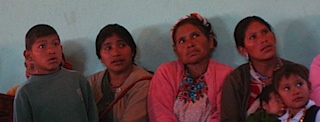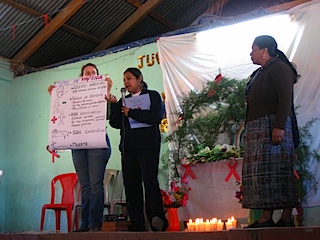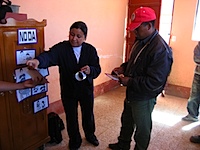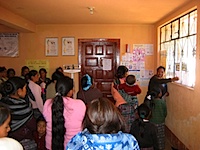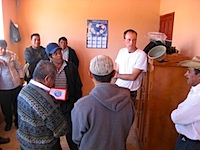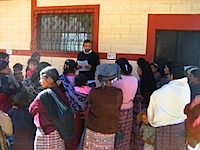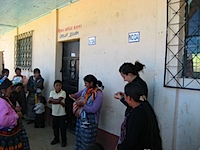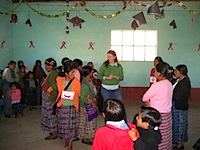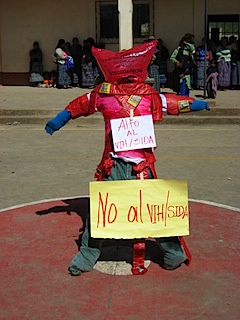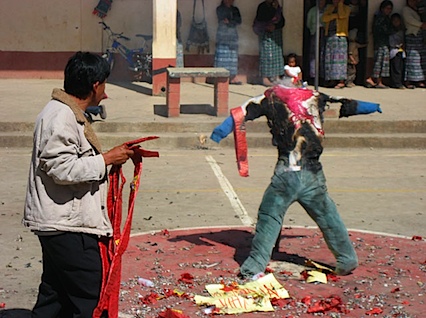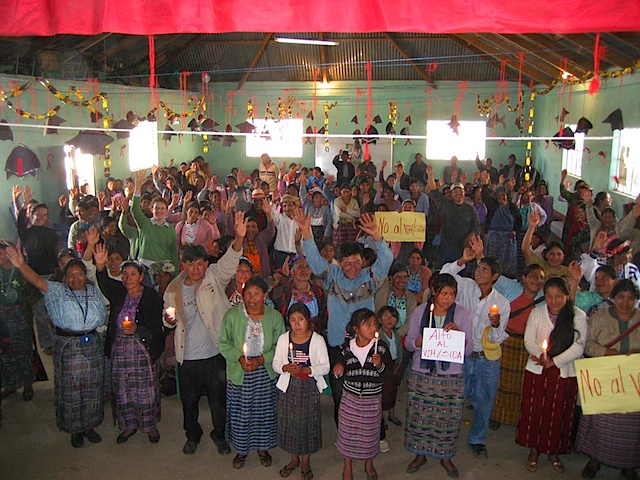
Hello all! It’s been a while. Suffice it to say that vacation surpassed any expectations we had about its possible excellence. I was so frequently humbled and awed by how great our friends and family are. It was fantastic to see you all; thanks for making it such a great vacation.
The trip there and back again was funny to me. I almost felt like we were time traveling. There are so many stops and changes along the way. The mode of transport changes, people’s appearances change gradually, the languages change, the technologies change. It’s really interesting to watch the world go by in this fashion. While visiting with my grandparents we were looking over a pile of photo albums as my grandma told us stories. She started talking about the kids (my mom and uncles) getting caught in a rainstorm during a May Day celebration and how she just ran them home and threw everything in the drier. “Grandma, what year was that?” She paused, figuring, and said, “oh, about 1954.” I was amazed. My grandparents have had in-home washers and driers since at least 1954 and I live and work with women who have no idea what a washer or drier looks like, nor how it functions. It really is like time traveling. We flew back to Guate on December 1 and spent the night in San Luis with Fletch’s host family. It was nice, going from our state-side family to our Guatemalan family. We spent all of the 2nd in chicken buses trying to make our way home, and still we missed the last bus to our village. We walked the last 40 minutes down the dirt road to our village in the dark. Our host family was pretty happy to see us. They invited us in to eat, even though they’d finished eating already, served us beans and tortillas, and told us the chuj was still hot if we wanted to bathe; we did. We ate around their fire, then hurried back to our house to grab our towels and soap before we ducked into the chuj. As I walked through the corn field, now devoid of corn and full of drying stalks, I thought, it’s so weird how quickly we can move between places. Here we are again, and it feels completely normal.
We’ve never before attempted the trip home in one day, and if we can avoid it, I don’t think we ever will again. It was incredibly exhausting, but we’d promised to be back for an 8am meeting on Dec. 3. As it turned out, we showed up for a meeting that everyone except the nurse had forgotten. At first I was disappointed we’d pushed ourselves to get back if the meeting wasn’t even going to happen, but as we started visiting the leaders who’d failed to show up, I realized it was probably best we’d gotten back promptly or we’d have no chance of organizing a health fair for Monday Dec. 7. People were happy to see we’d returned, and had to comment extensively on this before we could get down to business. When the nurse, Lucia, and I made it to Manuel’s house, he assured us he’d been working on the activities in our absence. Somehow the words he uses to reassure never quite have that effect on me. 😛
Before we left I’d said, during the initial planning of events, that we shouldn’t do a big lunch because this was just a community activity with no invited guests, and it’s always such a big expense and a lot of work for the women who prepare the meal. It also means that the women who work on the meal can’t participate in the activities. Ah, me and my ridiculous sentimentality toward the women…While I was away Manuel had worked extensively to invite all sorts of leaders from in town, and he’d promised them a lunch. He figured there would be about 40 people in attendance at the lunch (including of course himself, the nurses, and the 4 volunteers, since our friends Niko and Katal were coming to help with the activities). He’d invited the woman in charge of the local welfare program, bank representatives, cooperative representatives, police officers, the assistant mayor, school teachers (by far the most reasonable group of people to invite) and the radio station. “The radio needs to be paid though, and I don’t know how we’ll pay them. They say they’ll have to do the broadcast over the phone so they’ll need us to buy them a phone card, because the signal doesn’t reach between here and in town. Do you guys have money to pay the radio station?” I told him I’d talk to Jaime, which was really code for, “We aren’t paying the radio fees out of our own pocket.” I thought the radio would be more of a distraction than anything. And it’s not like we refuse to donate money to the activities. I was donating decorations, buying and making them myself, and we were planning on paying the fees out of our own pockets for the chicken vaccine guy who would be coming the following Wednesday.
Manuel talked my ear off. I think I was at his house for about 2 hours. He told me the leaders had scheduled a community clean-up day for Saturday morning and asked that Jaime and I be there to support the community. He also said he’d invited the community leaders from the surrounding communities to participate in the chicken vaccine campaign set for Dec. 9. Hey, at least he was working and enthusiastic right? This is also when he and his wife so graciously showed me how they’d taken care of our chicken for us in our absence… Ahh to be back in our cozy village again, I thought…Manuel had forgotten that we scheduled a meeting at 8 am so that the nurses could attend. He’d told everyone the meeting was at 4 o’clock. Lucia (the nurse) and I decided I’d go to the afternoon meeting and fill her in the next morning. I went home to tackle some of the pile of to-do tasks until 4 o’clock rolled around. I was tired out by 4 pm. Manuel was supposed to come get us on his way to the school; he showed up at 4:15, and I didn’t even realize it was actually after 4. I had to finish kneading bread and set it to its last rise, so I sent Fletch in my place and I showed up at 4:45… just in time for the meeting to start at 5. It didn’t end until 7:30. Fletch left early to make us dinner, start a fire, and haul bath water. Most of the meeting dealt with things like: where would the firewood come from to cook the meal? How big a pot do the women need to cook 25lbs of chicken? Who has a pot that big? Where were they going to cook the meal? How much money would each woman need to contribute to pay for the meal for our invited guests? Being tired only added to my annoyance that this meeting was so long because Manuel had done exactly what I suggested we NOT do. But they eventually came to suitable conclusions. The men decided they’d be in charge of decorating the altar for the Health Fair, and would get together on Sunday night to put it all together while the women cooked tamales for the next day.
I felt like I’d forgotten how tiring these entmoots can be, and how much work it is to try and do anything outside of the norm here, a health fair being “not the norm”. As the meeting came to a close, I was worried that maybe the whole Health Fair would be a disaster. What would a disaster look like, I wondered? The focus of the fair was to be on education and prevention of HIV/AIDS. International AIDS day was Dec. 1, while we were in an airplane, but the nurses were supportive and enthusiastic about coming up with a celebration anyway, even if a little delayed. So a disaster, I imagined, might be the men and women revolting, or shouting us off the stage when we started talking about intimate body parts and sex. We try to do what the community wants, so if that happened, maybe we’d just go home until the storm blew over? I didn’t know. I walked home in the dark somewhat shell-shocked. Being in the community all the time gets us used to the demands on us and on our time. Having just returned from vacation, we were definitely not back in the groove yet. At the very least, I was relieved to walk in to our warm little house, eat, bathe, and go to bed.
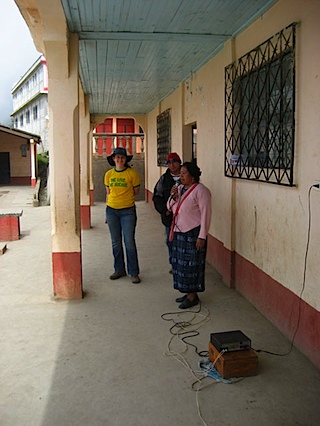 The first few days back were nothing but work work work to catch up and get back on track, phone calls, and hours spent on house chores like laundry. On Saturday, we ran around all morning helping with the community clean-up. Hah, at one point Chalio was walking around, not picking up trash, and I said, “Hey, Chali, come over and help me pick up this trash.” He shook his head no, he didn’t want to help. “If you just throw trash here forever and never pick it up, by the time you’re grown up there will be so much trash in these fields you won’t be able to grow your corn!” I said, half jokingly. I went to work cleaning up the field, and a minute later he was by my side, running back and forth from the trash to the bag I was carrying. As the community finished up and made their way back to the school, I gave a short talk on the loudspeaker about the importance of trash management. I congratulated the community on a job well done and gave them suggestions of ways to continue taking care of their trash, rather than just throwing it in the field and river. Since the talk was broadcast over the loud speaker, I got to give it twice–once in the direction of town, and again directed up the road to the last community in the valley. As soon as I was done talking, I had to excuse myself to go get cleaned up and ready to head in to town for the graduation.
The first few days back were nothing but work work work to catch up and get back on track, phone calls, and hours spent on house chores like laundry. On Saturday, we ran around all morning helping with the community clean-up. Hah, at one point Chalio was walking around, not picking up trash, and I said, “Hey, Chali, come over and help me pick up this trash.” He shook his head no, he didn’t want to help. “If you just throw trash here forever and never pick it up, by the time you’re grown up there will be so much trash in these fields you won’t be able to grow your corn!” I said, half jokingly. I went to work cleaning up the field, and a minute later he was by my side, running back and forth from the trash to the bag I was carrying. As the community finished up and made their way back to the school, I gave a short talk on the loudspeaker about the importance of trash management. I congratulated the community on a job well done and gave them suggestions of ways to continue taking care of their trash, rather than just throwing it in the field and river. Since the talk was broadcast over the loud speaker, I got to give it twice–once in the direction of town, and again directed up the road to the last community in the valley. As soon as I was done talking, I had to excuse myself to go get cleaned up and ready to head in to town for the graduation.
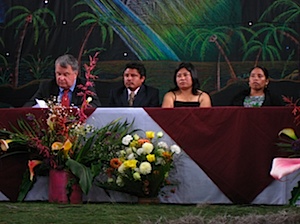 An RPCV (Returned Peace Corps Volunteer, from Guatemala 1967-70) was coming to visit us over the weekend. He’d told us about his upcoming visit before we left on vacation; I’d actually forgotten all about it until we got an email from him on Thursday. We agreed to attend a graduation with him at a school in Santa Eulalia on Saturday. We’d thought all the graduations were done, but this was a graduation not for high school, but for teachers who’d just completed their training. They are now certified to be government employees as teachers under the Ministry of Education. So after months of email communications we finally met RPCV Don Livingston of Computers for Guatemala, in person. The graduation started at 1 pm and didn’t end until about 5, which made for a long day after all the trash cleanup we’d done in the early morning sun. To top it off, I was definitely coming down with a gnarly cold and wanted to be home in bed. Even though we were invited to a special dinner with the head of the school, we opted out and got home just before dark. Don said he’d come out to visit us in person on Sunday. He wanted to see our little village after reading these blog posts for so long.
An RPCV (Returned Peace Corps Volunteer, from Guatemala 1967-70) was coming to visit us over the weekend. He’d told us about his upcoming visit before we left on vacation; I’d actually forgotten all about it until we got an email from him on Thursday. We agreed to attend a graduation with him at a school in Santa Eulalia on Saturday. We’d thought all the graduations were done, but this was a graduation not for high school, but for teachers who’d just completed their training. They are now certified to be government employees as teachers under the Ministry of Education. So after months of email communications we finally met RPCV Don Livingston of Computers for Guatemala, in person. The graduation started at 1 pm and didn’t end until about 5, which made for a long day after all the trash cleanup we’d done in the early morning sun. To top it off, I was definitely coming down with a gnarly cold and wanted to be home in bed. Even though we were invited to a special dinner with the head of the school, we opted out and got home just before dark. Don said he’d come out to visit us in person on Sunday. He wanted to see our little village after reading these blog posts for so long.
We spent the late morning and much of the afternoon Sunday with Don, showing him the house (a tour that takes about a minute and a half) as well as introducing him to our neighbors. He did interviews with us as well as with some of the neighbor kids, as he’s working on a type of video to help get funding for a local school project. It was fun and interesting to get to talk with him in person, but it made the afternoon disappear, and there were still Health Fair decorations to be made and hung up in the salon. We had an altar to make for our closing prayer session and lots of red ribbons to be cut and taped all over the walls. And we had to make dinner for four, as Niko and Katal were on the way out to the village.
Manuel sent his son over to the house to let us know he was headed to the salon to start decorating. I ran down with my arms full of red construction paper and partially constructed ribbons. As I sat there taping together the ribbons, Manuel began to grumble about all the people who promise they’ll show up and then don’t. He was annoyed that only two men (himself included) of the 6 that had been at the meeting had shown up to make an altar. This was funny to me because I can’t count the times Manuel has blatantly stood us up. But he was there that day. The thing that kills me about this guy is that, even though I find him incredibly difficult to work with, frequently offensive and annoying, I can’t peg him. Sometimes he really comes through. And he usually at least expresses a desire to make things better and to do a good job. Sometimes his actions are contrary to what he says, and sometimes they’re right on. He’d put his reputation on the line by inviting so many people to this event. He and Elias, another committee member, got busy sweeping and cleaning before they went out to cut some fresh pine branches for the altar.
Niko and Katal showed up while I was decorating. Niko came to help me tape up all the red ribbons and Peace Corps AIDS day posters as we gave the guys advice on what we thought would look best. The decorations were simple, but they did make everything look better. As I watched women who’d been busy making tamales all afternoon wander in to talk to the men about the altar and bring flowers to add to the decorations, I thought “Really, this is all I want from this event. I just want the community to come together and have some fun. If someone manages to learn something, well, that’ll be just great.”
With that in mind, I finished up and walked home with Niko to have dinner. Hilariously, people in our village apparently cannot really tell Niko and Fletch apart. Although Niko is taller, darker and bearded, he looks just the same as Jaime. I’m honestly surprised the ladies don’t notice Niko’s lack of blue eyes, since they’ve expressed so much interest in their future children having Jaime’s blue eyes…It’s pretty funny. Shortly after arriving home Fletch asked, “So if this thing turns out to be a disaster, are you going to cry?” Hehe. I told him I was not going to cry and shared with him what I decided while decorating the hall.
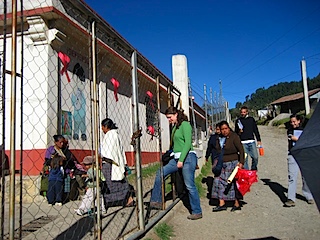 Monday came, with great anticipation, and I think we were all more or less ready for it. I was a little sad waiting for things to begin when I saw that there was ONE man in the hall as an audience member with over 100 women and children. There was a group of men loitering outside, though. I asked Fletch if he’d please go invite them in, even if they had no intentions of participating. Niko offered to go with him. Niko has turned into a local celebrity, much more so than either one of us, because he plays Sunday basketball in the center of Santa Eulalia, right in the middle of all the market day hustle and bustle. The guys love it. The joint Jaime/Niko invite was enough to pull twenty-four guys off the basketball court and into the hall. Yay.
Monday came, with great anticipation, and I think we were all more or less ready for it. I was a little sad waiting for things to begin when I saw that there was ONE man in the hall as an audience member with over 100 women and children. There was a group of men loitering outside, though. I asked Fletch if he’d please go invite them in, even if they had no intentions of participating. Niko offered to go with him. Niko has turned into a local celebrity, much more so than either one of us, because he plays Sunday basketball in the center of Santa Eulalia, right in the middle of all the market day hustle and bustle. The guys love it. The joint Jaime/Niko invite was enough to pull twenty-four guys off the basketball court and into the hall. Yay.
As I mentioned before, I was a little bit worried about the scandal of talking about private body parts and how it would go over in such a big group. It’s something we’ve eased ourselves into during our more intimate weekly health talks with the women, but now there was a crowd of people who were not regular attendees in front of us. Miraculously, no one rioted. We did get a funny funny picture, this little boy’s face is in reaction to showing drawings of a nude man and nude woman. We had the man wearing a traditional cowboy hat and woman wearing the traditional scarf tied in wreath around her head. I think the fact that they were drawings rather than pictures made them less shocking. The nurses and Aurelio, our local counterpart, did most of the explaining in Q’anjob’al with the aid of all Jaime’s hand drawn posters, before we split the 180 adults in attendance into six groups to do 3 different educational activities. I was really pleased with the turnout.
Just before the initial talk was finished we decided how to split up the groups. Fletch said, “I know you’re all about mixing up the men and women, but today I think we should have a men’s only group so that they’re comfortable and can ask questions.” I totally agreed, but the funniest part was when Manuel came over all in a tizzy, unsure of how we were going to break these groups down. We told him we’d already counted the number of people present and decided 180 people would be split into six groups. I wish I could have had a picture of the look of absolute RELIEF on his face when I said that we were putting all the men in one group. I was biting my tongue so as not to laugh.
We had three activities for each group, but six groups, so we made sure to have three groups in the health center and three groups at the school doing the same activities. Niko and Katal helped us a ton by doing two of the six activity stations. The nurses had studied the Peace Corps HIV/AIDS teaching manual and did an activity each, and Jaime and I covered the other two. Aurelio was supposed to run around making sure everything was running more or less smoothly. It turned out that his job was so easy he mostly just took photos. The small groups were all engaged and asking really great questions, and the time flew by.
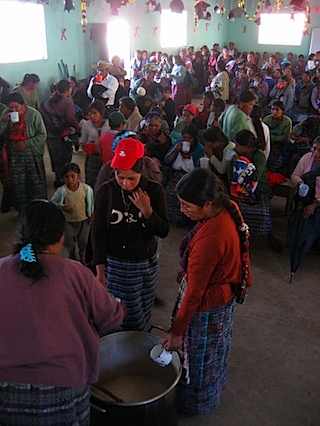 After the activities, the giant pots of rice and cinnamon atol were brought out for everyone. I mentioned in a previous post that we planned on making announcements before the health fair that everyone was supposed to bring their own cups from home to reinforce our messages about trash management and money savings. The women’s committee seemed ok with this idea. Since we’d just done the community clean up on Saturday, trash was fresh in everyone’s mind, but since they’re not used to bringing their own cups, it led to lots of people scrambling for cups to borrow from nearby houses. I liked it, though. This health fair was a great opportunity to actually practice some of the things we’ve talked about over last 15 months. One of the hardest things about this education stuff is wondering if the information is ever put into practice, so getting the opportunity to reinforce our messages with actions on a large scale, even for just half a day, felt like an accomplishment.
After the activities, the giant pots of rice and cinnamon atol were brought out for everyone. I mentioned in a previous post that we planned on making announcements before the health fair that everyone was supposed to bring their own cups from home to reinforce our messages about trash management and money savings. The women’s committee seemed ok with this idea. Since we’d just done the community clean up on Saturday, trash was fresh in everyone’s mind, but since they’re not used to bringing their own cups, it led to lots of people scrambling for cups to borrow from nearby houses. I liked it, though. This health fair was a great opportunity to actually practice some of the things we’ve talked about over last 15 months. One of the hardest things about this education stuff is wondering if the information is ever put into practice, so getting the opportunity to reinforce our messages with actions on a large scale, even for just half a day, felt like an accomplishment.
As we approached lunch time and it became apparent to Manuel that most of his invited guests weren’t going to show up, he looked kind of hurt. I’ll admit, I felt a little bad for him. But since so many community leaders, men he hadn’t planned on coming, had come, he asked us if it would be ok to invite them to the lunch. We agreed it was a good idea, and he ran off to tell them. We finished the educational section of the fair by doing a talk on prevention of HIV: abstinence, fidelity in a relationship and condoms. This included a demonstration on how to properly use a condom. All the tittering and laughing would have made you think we were doing this in a middle school, but the room was full of adults. We turned it into a comical, but to the point, display since it was hard for us not to laugh with them.
Once that uncomfortable bit (much more for them than for us) was done we had a prayer session. This was the nurse Lucia’s idea. She stressed to me that this is their culture, and so it should be done. I wanted the planning for this to be collaborative, which means I jumped right on her suggestion. We prayed for those who’ve died of AIDS, those living with the disease, and for the future well-being of the community. Coming back to comfortable territory worked well, and they got in to it. 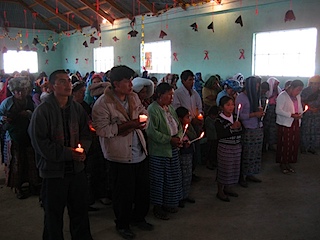 <
<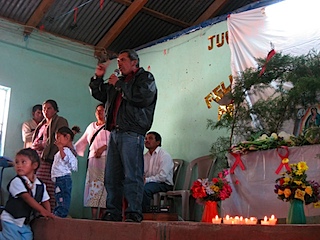
But the best part of the whole day? The grand finale when we burnt an effigy of the devil, of course! In Guatemala on December 7 it’s tradition for households to make devil effigies out of old clothes. Here they generally stuff the clothes with old cornstalks. The burning of the devil is said to cleanse your house of any bad spirits to make way for Christmas and the coming of Christ. I must admit, it’s actually a pretty fun tradition. They start the fire by setting off fire crackers. It was cool to do as part of the health fair, but it was even cooler at night when the sparklers and whistlers came out in the dark. Our daytime devil had a lot of red on, including a blown up red plastic bag for a head. It was a good ending for the community.
This year I was thinking about how, last year at this time, I felt kind of bad for not organizing something for International AIDS day. Last year the timing felt wrong. We’d not yet broached any controversial topics in our weekly health talks. I didn’t feel confident enough that people wouldn’t get mad at us for talking about anything to do with the highly taboo topic of sex/sexuality. This year everything went fantastically well. Better to do the job once, and well, than to try and do something half way with people who aren’t ready for it.
Over the lunch Manuel organized, we had the opportunity to debrief a bit, to ask the leaders what they thought of the activities and information. They were positive about the information and about the importance of talking about these things. It was even suggested by some that we talk about this information to the couples in premarital classes in the Catholic church. We told them we’re available any time and we’d love to share the information with whoever wants it. This last suggestion was really interesting to me because it would do well to combat this double standard of rampant Christianity and machismo. Everyone here identifies as Christian, most of them consider themselves devoutly Catholic, but that doesn’t mean they feel a need to be faithful to their wives. Though their religion counsels them otherwise, the cultural norm of men having multiple partners generally wins out in their lives which is why the fastest growing demographic of infected Guatemalans are housewives and their newborn babies. So to me, doing HIV/AIDS education with couples in premarital counseling feels kind of ground breaking.
Our goal with this educational series is not to force beliefs on the people we work with. They’ve traditionally been silent in regards to sexuality. That’s just always been their way. We don’t want to say, “You have to think THIS about sexuality.” You see this society, once quiet and isolated, just 15 and 20 years ago, is now connected to the world–through television, radio, computers, magazines, immigration to more developed areas of Guatemala and to places like the US. Their children get messages from all of these mediums in regards to sexuality, and those messages aren’t always accurate or positive or in line with familiar and/or religious beliefs. We’re trying to make town leaders and teachers aware that if they choose to talk about sexuality with their children and within their churches rather than remain silent, then they can combat these outside messages by putting sexuality in the context of their local beliefs. The discussion we had over lunch led me to believe that, just maybe, folks here are getting the idea.
Exito means “success”, and that’s what I’ve declared our Feria de Salud, the health fair, to be– a success. And that, to me, is also a great relief.
